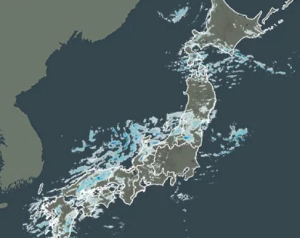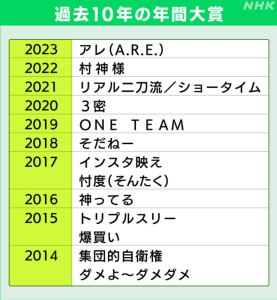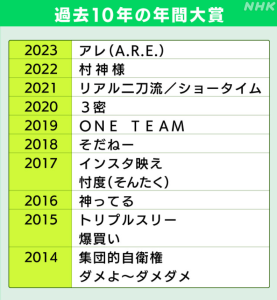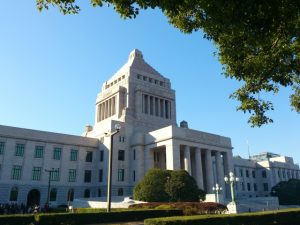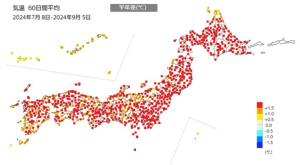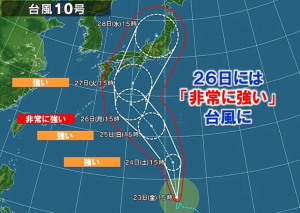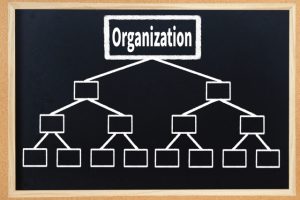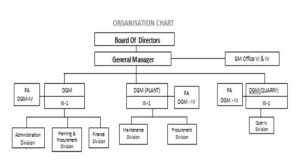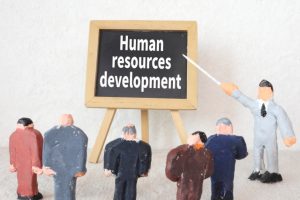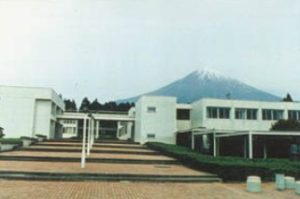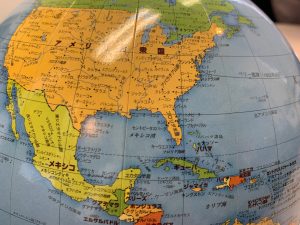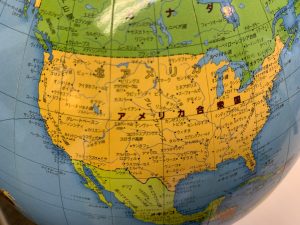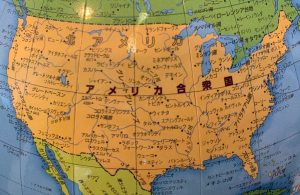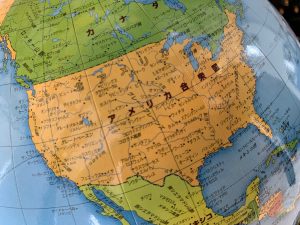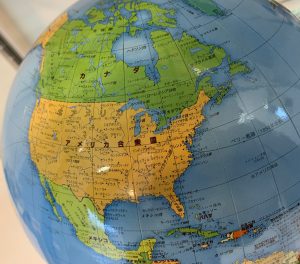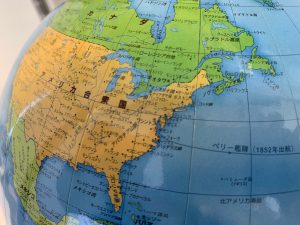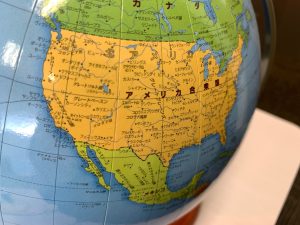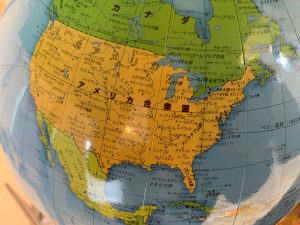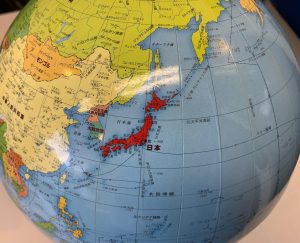Re: A news item and subject which I just want to check out (71) December 9, 2022
“The U-Can New Words and Buzzwords Awards in 2022” choosing words that became a topic of conversation this year was published on December 1, and “Nurakami sama”, which shows success of professional baseball player, Munetaka Murakami for the Tokyo Yakult Swallows achieving the triple crown the youngest player in history, was chosen. Top 10 has “state funeral”, “religion second generation”, “Kyiv” and so on. “30 candidates” were published on November 4 but if they were published early December, some people say that “bravo”, which means “excellent or brilliant”, shouted repeatedly by football player Nagatomo in the middle of Japanese team’s success at FIFA world cup in Qatar may be chosen.
Incidentally, applying for an annual event “Kanji of the year” was closed on December 5, and it will be published at Kiyomizu-dera in Kyoto Prefecture on December 12.
And president Zelenskyy and “spirit of Ukraine” were chosen as “person of the year” which Time, an American news magazine, has continued since 1927. I suppose this is what everyone agrees. By the way, CEO of Tesla Elon Musk was chosen last year, but he should be said “noisy person” rather than “person of the year”.
■■This week has been a week with a lot of buzz, too.
■Agriculture and marine products in Japan:
*The export amount of agricultural, forestry and fishery products and food products from Japan from January to October this year reached 1.1218 trillion yen increased by 45.3% over the same period of the last year. The amount exceeded 1 trillion yen one month earlier than the last year when it exceeded 1 trillion yen for the first time. By item, scallop, yellowtail and so on went well and not only Japanese sake and whisky but also fruits such as strawberry and peach increased significantly compared to the same period of the last year. By destination, export to China was 229.3 billion yen increased by 24.5% and export to the United States was 165.5 billion yen increased by 20.8%. Japanese government is setting a goal to achieve 2 trillion yen exports in 2025 and 5 trillion yen exports in 2030.
*The number of agricultural workers in Japan was 1.58 million in 2016, but reduced to 1.3 million in 2021. Moreover, those aged 65 and over account for about 70%, and agricultural workers are aging. On the other hand, 20s or younger account for only 1%, and shortage of agricultural workers will inevitably get worse.
Due to such situation, farmland area is steadily decreasing in Japan. According to the survey of the Ministry of Agriculture, Forestry and Fisheries, 423 thousand hectares equivalent to area of Toyama Prefecture became abandoned farmland as of 2015. Of course, introduction of “smart agriculture” using IT and robots is also progressing. But automations are said to have their limits, because they are expensive and about 40% of farmland in Japan is located at mountainous areas and a small farmland. I visited Yabu City located in the northern part of Hyogo Prefecture which is designated as a base for agricultural reform, National Strategic Special Zone, and I was able to feel the reality of “smart agriculture” such as pesticide spraying by drone, unmanned grass cutter and so on.
*It is said that agriculture in Japan should learn from Netherlands. Both countries have things in common like their land is not large and their weather is not severe. The export amount of agricultural products in Netherlands is 100.9 billion dollars, over ten times more than Japan in 2020. It falls short of 147.9 billion dollars in the United States, but ranks second in the world. It is said that its earning power is 150 times more than Japan and the United States. It is said that Netherlands was not a major agricultural export country from the beginning, but narrowing down to agricultural products with high profit ratio has a big impact. Japan just adopts safeguards to protect agriculture, and at the same time offensive policy turning agriculture into an export industry is required.
■Implementing drastic policy is necessary:
Why does Japan take so long to enforce or implement measures that touch on the foundations of the country? For instance, making my number cards available to all citizens. About seven years will pass in January next year since the start of the issuance, but still 60% as of November 27. In the United States, there is social security number as an equivalent for this number. The United States protected by stringent privacy started this system 86 years ago. At the present time, if those residing in the United States don’t obtain this number, they are not able to have a social life, because they can’t get electricity, gas, and driver’s license and can’t open bank account. By national identification number, administrative procedures and enforcement are very fast. Introducing my number card is the biggest administrative reform for Japan. Extending the date and the deadline once decided and postponements are conspicuous in other policies. If Japanese government does not advance its policy being prepared to give the people bitter medicines once in a while, Japan is rapidly left behind by the global tide.
An economic community in which I put myself can’t help but say that it is not good at “decluttering”, too. In Japan, both politics and economy put emphasis on “internal therapy”, but in the United States, “surgical operation” is the main. High-tech companies that grew rapidly are also implementing drastic layoffs now. Therefore, recovery is quick. Of course, there is a difference in culture between Japan and the United States, but Japan supports companies by subsidy like employment adjustment subsidy. Because of that, apparent unemployment and bankruptcies are kept low. However, on the other hand their dependance on the government grows, and Zombie companies are also left preserved. Therefore, the metabolism by reorganization and selection is not progressing. In other words, mechanism of free market economy becomes non-functional, and productivity in Japan is the lowest in developed countries. The national debts go on increasing. I wonder if these are piling up and causing a decline or weakening in national power and corporate strength.












